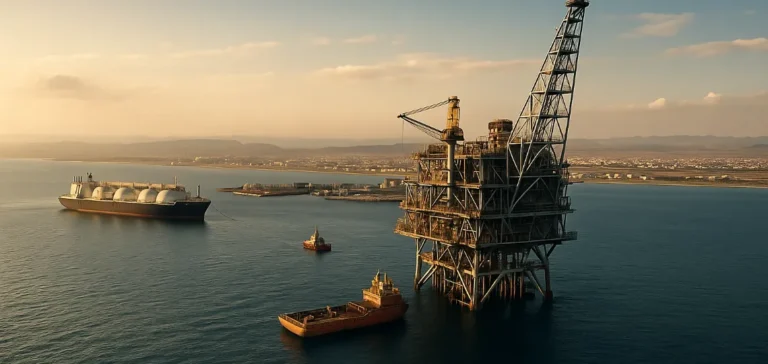Israel has restarted exporting surplus natural gas to Egypt and Jordan after several days of interruption. This resumption occurs while two of the country’s three main offshore fields, Leviathan and Karish, remain offline following a decision by the Israeli government on June 13. The quantities currently exported originate exclusively from the Tamar field, which continued operations throughout the suspension period. The Israeli Ministry of Energy stated that these exports are limited solely to volumes surplus to domestic market needs.
Limited recovery after a complete suspension
The initial suspension completely halted gas flows to Egypt and Jordan, two countries heavily dependent on Israeli energy imports. According to the Israeli Ministry of Energy, the current exports represent reduced volumes, contingent upon fluctuations in domestic electricity demand. Israel’s electricity sector consumed 10.9 billion cubic meters (Bcm) of gas in 2024, a 7% year-over-year increase, reflecting steadily growing domestic demand. Despite the resumed flows, no timeline has been provided for fully restarting the two halted fields, Leviathan and Karish.
Egypt faces increased dependency
Egypt, experiencing a significant decline in domestic gas production, relies heavily on supplies from Israel and international imports of liquefied natural gas (LNG). In March 2025, Egyptian imports of Israeli gas reached 0.9 Bcm, confirming the rising trend observed since 2024. Following the sudden halt of Israeli deliveries, Egyptian authorities swiftly activated an emergency plan to prioritize internal gas distribution. Egypt has also accelerated technical preparations for a Floating Storage and Regasification Unit (FSRU), named Energos Eskimo, currently stationed at the port of Ain Sokhna.
A regional market under pressure
Recent events highlight the fragility of the regional gas market, vulnerable to supply disruptions caused by abrupt national decisions. Egypt and Jordan, dealing with unexpected disruptions, are now seeking to further diversify their energy sources to ensure greater network stability. For the time being, Israel’s limited resumption of exports provides temporary relief but simultaneously raises questions about the sustainability and long-term security of these regional energy agreements.






















